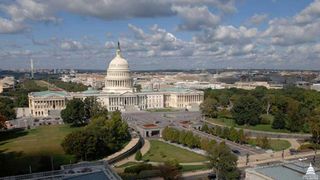CRA to Block Internet Reg Rollback Launching Tuesday

Sen. Ed Markey (D-Mass.) is introducing the Congressional Review Act resolution Tuesday (Feb. 27) to nullify the Restoring Internet Freedom Order. On the House side, 150 Democrats have introduced a similar measure.
The timing makes sense given that Feb. 27 marks network neutrality activists' OneMoreVote day of action on pushing for the one more Republican vote the CRA would need to pass the Senate, as long as all those who have said they support it, including one Republican already, actually voted for it.
Related: Pai Issues Net Neutrality Facts
The publication of the Restoring Internet Freedom order last week triggered a 60-legislative-day window for voting the CRA resolution.
Republicans used such a resolution to nullify the Tom Wheeler FCC's broadband privacy framework, but they had control of all the levers. The Democratic-led CRA to roll back the order is a very long shot, and more likely more of an effort to keep the issue top of mind going into the midterm elections.
The House version of the CRA was pushed by Communications Subcommittee ranking member Mike Doyle (D-Pa.).
“The time is now for us to take action and preserve the free and open internet,” said Rep. Doris Matsui (D-Calif.), one of those 150 Democrats that have signed on. “Businesses, consumers, and students depend on strong net neutrality protections to innovate and create. I’m calling on my colleagues in Congress to join us in support of this resolution, which would ensure there are strong rules of the road in place to protect the future of the internet.”
“Today’s short-sighted efforts by some to substitute the drafting of smart, bipartisan net neutrality legislation with the blunt instrument of the CRA is neither pro-consumer nor pro-innovation," said USTelecom president Jonathan Spalter. "While the CRA might offer the political equivalent of a temporary sugar high, if Congress truly wants to ensure our internet’s future will be as open, dynamic and free as it has been since its inception, the only way forward is bipartisan legislation that codifies the net neutrality principles our nation’s broadband providers have committed to uphold once and for all. America’s consumers expect and deserve nothing less.”
“It’s hard to imagine a better or more popular use for the CRA than restoring network neutrality," said Jay Stanley, senior policy analyst with the American Civil Liberties Union. "Net neutrality is overwhelmingly popular across the country — recent polling shows 83 percent of voters support net neutrality, including 75 percent of Republicans, 89 percent of Democrats and 86 percent of independents. Twenty-seven states have introduced net neutrality bills, and the governors of five states have already signed net neutrality executive orders. The ACLU strongly supports the introduction of this measure to undo the FCC’s evisceration of our network neutrality protections, and we urge Congress to send the bill to the White House, and President Trump to sign it, as quickly as possible.”
“Mobile Future supports an open Internet but the Congressional Review Act (CRA) is not the right vehicle for bringing the benefits of broadband to every American consumer," said Robert McDowell, chief public policy adviser to Mobile Future, and a former Republican FCC Commissioner. "Reverting back to Title II rules is nothing but a recipe for stifling innovation and chilling wireless infrastructure investment. We should work together on comprehensive legislation that will preserve the open Internet ecosphere and finally end this arduous debate.”
Broadcasting & Cable Newsletter
The smarter way to stay on top of broadcasting and cable industry. Sign up below
Contributing editor John Eggerton has been an editor and/or writer on media regulation, legislation and policy for over four decades, including covering the FCC, FTC, Congress, the major media trade associations, and the federal courts. In addition to Multichannel News and Broadcasting + Cable, his work has appeared in Radio World, TV Technology, TV Fax, This Week in Consumer Electronics, Variety and the Encyclopedia Britannica.

